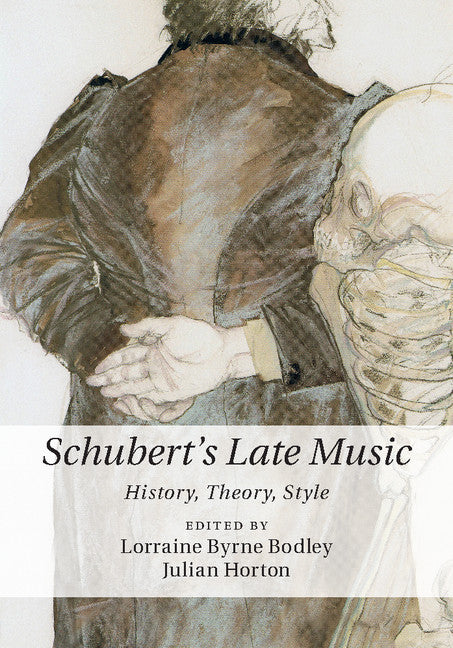Freshly Printed - allow 8 days lead
Couldn't load pickup availability
Schubert's Late Music
History, Theory, Style
A thematic exploration of Schubert's style, applied in readings of his instrumental and vocal literature by international scholars.
Lorraine Byrne Bodley (Edited by), Julian Horton (Edited by)
9781107111295, Cambridge University Press
Hardback, published 7 April 2016
490 pages, 5 b/w illus. 18 tables 187 music examples
25.6 x 17.6 x 2.6 cm, 1.09 kg
Schubert's late music has proved pivotal for the development of diverse fields of musical scholarship, from biography and music history to the theory of harmony. This collection addresses current issues in Schubert studies including compositional technique, the topical issue of 'late' style, tonal strategy and form in the composer's instrumental music, and musical readings of the 'postmodern' Schubert. Offering fresh approaches to Schubert's instrumental and vocal works and their reception, this book argues that the music that the composer produced from 1822–8 is central to a paradigm shift in the history of music during the nineteenth century. The contributors provide a timely reassessment of Schubert's legacy, assembling a portrait of the composer that is very different from the sentimental Schubert permeating nineteenth-century culture and the postmodern Schubert of more recent literature.
Introduction: Schubert's late style and current musical scholarship Lorraine Byrne Bodley
Part I. Reception Histories: 1. 'Classical' music and Viennese resistance to Schubert's Beethoven project John M. Gingerich
2. Beethoven, Schubert, and the movement of phenomena Scott Burnham
3. [Un]Himmlische Länge: editorial intervention as reception history Anne M. Hyland
4. Citation, narrative and meaning: Woody Allen and the late Schubert Harry White
Part II. The Late Instrumental Music (1): Hermeneutics and Performance: 5. Schubert's alchemy: transformative surfaces, transfiguring depths Robert S. Hatten
6. Against the grain: Op. 78 and a hermeneutics of late style Richard Kramer
7. Schubert's Wiegenlied: the Andante sostenuto from the Piano Sonata in B flat, D. 960 Eric Wen
8. Schubert's reconciliation of gothic and classical influences Marjorie Hirsch
9. The first movement of Schubert's Piano Sonata D. 959 and the performance of analysis Julian Horton
Part III. The Late Instrumental Music (2): Meaning and Genre: 10. Schubert hearing Don Giovanni: Mozartian death music in the 'Unfinished' Symphony Glenn Stanley
11. Longing for the unattainable: the second movement of the 'Great' C major Symphony Lauri Suurpää
12. Tonal recollection in Schubert's late instrumental music Ryan McClelland
13. Detours, wrong tracks, and dead ends: the 'wanderer' in the labyrinth of Schubert's late instrumental music Xavier Hascher
14. Formal ambiguity and generic reinterpretation in the late instrumental music Su-Yin Mak
Part IV. Defining Late Style: 15. The 'problem of solitude' and critique in song: Schubert's loneliness Susan Youens
16. Music of the orphaned self? Schubert and concepts of late style Lorraine Byrne Bodley
17. Bounded finitude and boundless infinitude: Schubert's contradictions at the 'final barrier' Blake Howe
18. Invocations of memory in Schubert's last songs Jürgen Thym
19. 'The prerogative of late style': thoughts on the expressive world of Schubert's late works Benjamin M. Korstvedt
20. Singing against late style: the problem of performance history Laura Tunbridge.
Subject Areas: Philosophy: aesthetics [HPN], Philosophy [HP], Musical instruments & instrumental ensembles [AVR], Individual composers & musicians, specific bands & groups [AVH], Classical music [c 1750 to c 1830 AVGC4], Music: styles & genres [AVG], Music reviews & criticism [AVC], Theory of music & musicology [AVA], Music [AV], Performance art [AFKP]


